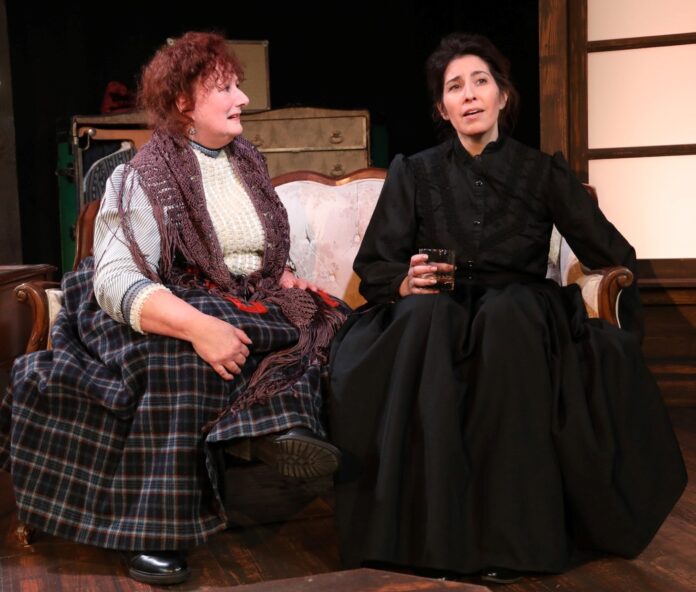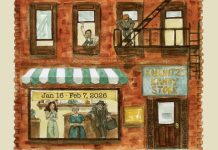
By Shari Barrett
Torrance Theatre Company continues its 2022-2023 season with playwright Lauren Gunderson’s The Half-Life of Marie Curie, an intimate play about renowned Nobel Prize-winning scientist Marie Curie, and engineer Hertha Ayrton, reveling in the power of female friendship as it explores the relationship between these two brilliant women, both of whom are mothers, widows, and fearless champions of scientific inquiry. It was a friendship that strengthened their resolve to pursue their ambitions in the early 20th Century, a time when women’s equality in the workplace and at the ballot box made headlines.
In 1911, Marie Curie won the Nobel Prize in Chemistry for her discovery of the elements radium and polonium. By 1912, she was the object of ruthless gossip over an alleged affair with the married Frenchman Paul Langevin, all but erasing her achievements from public memory. Weakened and demoralized by the press lambasting her as a “foreign” temptress and a home-wrecking traitor, Marie agrees to join her friend and colleague Hertha Ayrton, an electromechanical engineer and suffragette, at her rustic home in England away from the French reporters hounding Marie at home. Once together, the women share the trials and tribulations on the road to success in a male dominated world.
This two-woman play is brilliantly directed by Cary Jordahl, who also designed the evocative set that uses the power of light to create the bright neon green of radium at the center of Curie’s life. The production features two separate casts who will share the 15 performances. The “Radium Cast” is Melissa Brandzel as Marie Curie, and Shirley Hatton as Hertha Ayrton; the “Polonium Cast” is Amanda Webb as Marie Curie, and Jennifer Faneuff as Hertha Ayrton. My review covers the Radium Cast performance I attended.
Perhaps best known as musical theatre entertainers, both Hatton and Brandzel prove that truly exceptional actors can fully take on such dramatic roles with authenticity, fully embodying the hearts and souls of each character. Thus, the two draw you into their characters’ struggles as women from the perspective of modern times, effectively reminding us that the struggle for equality and recognition inspired them to support each other in achieving their goals. Hatton is a wonder as she morphs from outrageous anger to soul-searching empathy, with Brandzel matching her beat for beat, especially when Curie breaks down worrying that the romantic scandal surrounding her may negate her scientific discoveries. When the two finally sit down to enjoy a bottle of whiskey together, more secrets are revealed about the nature of that scandal, which in fact did happen over a number of years.
There are so many facts revealed in the program notes, I scarcely know which ones to mention that added important background to the play. Aside from winning the Nobel Prize twice, first in Physics and then for Chemistry, Curie was also the first woman to teach in the Sorbonne. And during World War I, Curie with the help of her daughter Irène devoted herself to the development of portable X-radiography to save the lives and limbs of soldiers in the field. And the list goes on and on.
British born physicist Herta Ayrton was a non-conformist from her youth, inspiring Curie with her strong views of equality in the scientific work place and devotion to protesting as a suffragette. A devoted mother to her daughter Barbara, during the summer of 1903, Ayrton met and befriended fellow scientist Marie Curie, herself a mother of two daughters, which no doubt furthered their belief in female equality. And when you leave the theater, you will want to learn more about these two extraordinary women who struggled for the recognition they so deserved simply because they were female, and due to the remarkable performances of Hatton and Brandzel.
In the background is often heard the staccato of a Geiger counter reacting to the radioactivity first named by Curie, who always carries a small vial of radium with her as a source of comfort. Of course, now we know that led to her death after suffering health problems her entire life. But the magical power of the shiny element was more than she could resist, believing it was her greatest scientific discovery.
The Half-Life of Marie Curie performances continue through Feb. 25 on Thursday at 7 p.m., Friday/Saturday at 8 p.m., Sunday at 2 p.m. with an additional 2 p.m. matinee on Saturday Feb. 18 and Feb. 25, at Torrance Theatre Company, 1316 Cabrillo Ave in the heart of downtown Torrance. Ticket prices are $30 available at www.TorranceTheatreCompany.com Mask wearing is optional.


















